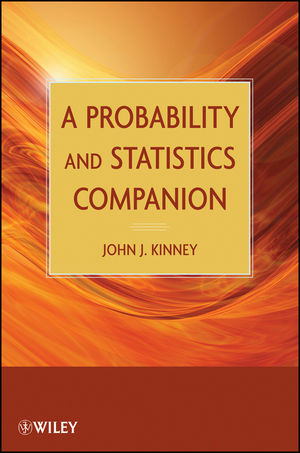A Probability and Statistics CompanionISBN: 978-0-470-47195-1
Paperback
280 pages
June 2009
 |
||||||
Preface xv
1. Probability and Sample Spaces 1
Why Study Probability? 1
Probability 2
Sample Spaces 2
Some Properties of Probabilities 8
Finding Probabilities of Events 11
Conclusions 16
Explorations 16
2. Permutations and Combinations: Choosing the Best Candidate; Acceptance Sampling 18
Permutations 19
Counting Principle 19
Permutations with Some Objects Alike 20
Permuting Only Some of the Objects 21
Combinations 22
General Addition Theorem and Applications 25
Conclusions 35
Explorations 35
3. Conditional Probability 37
Introduction 37
Some Notation 40
Bayes’ Theorem 45
Conclusions 46
Explorations 46
4. Geometric Probability 48
Conclusion 56
Explorations 57
5. Random Variables and Discrete Probability Distributions—Uniform, Binomial, Hypergeometric, and Geometric Distributions 58
Introduction 58
Discrete Uniform Distribution 59
Mean and Variance of a Discrete Random Variable 60
Intervals, σ, and German Tanks 61
Sums 62
Binomial Probability Distribution 64
Mean and Variance of the Binomial Distribution 68
Sums 69
Hypergeometric Distribution 70
Other Properties of the Hypergeometric Distribution 72
Geometric Probability Distribution 72
Conclusions 73
Explorations 74
6. Seven-Game Series in Sports 75
Introduction 75
Seven-Game Series 75
Winning the First Game 78
How Long Should the Series Last? 79
Conclusions 81
Explorations 81
7. Waiting Time Problems 83
Waiting for the First Success 83
The Mythical Island 84
Waiting for the Second Success 85
Waiting for the rth Success 87
Mean of the Negative Binomial 87
Collecting Cereal Box Prizes 88
Heads Before Tails 88
Waiting for Patterns 90
Expected Waiting Time for HH 91
Expected Waiting Time for TH 93
An Unfair Game with a Fair Coin 94
Three Tosses 95
Who Pays for Lunch? 96
Expected Number of Lunches 98
Negative Hypergeometric Distribution 99
Mean and Variance of the Negative Hypergeometric 101
Negative Binomial Approximation 103
The Meaning of the Mean 104
First Occurrences 104
Waiting Time for c Special Items to Occur 104
Estimating k 105
Conclusions 106
Explorations 106
8. Continuous Probability Distributions: Sums, the Normal Distribution, and the Central Limit Theorem; Bivariate Random Variables 108
Uniform Random Variable 109
Sums 111
A Fact About Means 111
Normal Probability Distribution 113
Facts About Normal Curves 114
Bivariate Random Variables 115
Variance 119
Central Limit Theorem: Sums 121
Central Limit Theorem: Means 123
Central Limit Theorem 124
Expected Values and Bivariate Random Variables 124
Means and Variances of Means 124
A Note on the Uniform Distribution 126
Conclusions 128
Explorations 129
9. Statistical Inference I 130
Estimation 131
Confidence Intervals 131
Hypothesis Testing 133
β and the Power of a Test 137
p-Value for a Test 139
Conclusions 140
Explorations 140
10. Statistical Inference II: Continuous Probability Distributions II—Comparing Two Samples 141
The Chi-Squared Distribution 141
Statistical Inference on the Variance 144
Student t Distribution 146
Testing the Ratio of Variances: The F Distribution 148
Tests on Means from Two Samples 150
Conclusions 154
Explorations 154
11. Statistical Process Control 155
Control Charts 155
Estimating σ Using the Sample Standard Deviations 157
Estimating σ Using the Sample Ranges 159
Control Charts for Attributes 161
np Control Chart 161
p Chart 163
Some Characteristics of Control Charts 164
Some Additional Tests for Control Charts 165
Conclusions 168
Explorations 168
12. Nonparametric Methods 170
Introduction 170
The Rank Sum Test 170
Order Statistics 173
Median 174
Maximum 176
Runs 180
Some Theory of Runs 182
Conclusions 186
Explorations 187
13. Least Squares, Medians, and the Indy 500 188
Introduction 188
Least Squares 191
Principle of Least Squares 191
Influential Observations 193
The Indy 500 195
A Test for Linearity: The Analysis of Variance 197
A Caution 201
Nonlinear Models 201
The Median–Median Line 202
When Are the Lines Identical? 205
Determining the Median–Median Line 207
Analysis for Years 1911–1969 209
Conclusions 210
Explorations 210
14. Sampling 211
Simple Random Sampling 212
Stratification 214
Proportional Allocation 215
Optimal Allocation 217
Some Practical Considerations 219
Strata 221
Conclusions 221
Explorations 221
15. Design of Experiments 223
Yates Algorithm 230
Randomization and Some Notation 231
Confounding 233
Multiple Observations 234
Design Models and Multiple Regression Models 235
Testing the Effects for Significance 235
Conclusions 238
Explorations 238
16. Recursions and Probability 240
Introduction 240
Conclusions 250
Explorations 250
17. Generating Functions and the Central Limit Theorem 251
Means and Variances 253
A Normal Approximation 254
Conclusions 255
Explorations 255
Bibliography 257
Where to Learn More 257
Index 259



